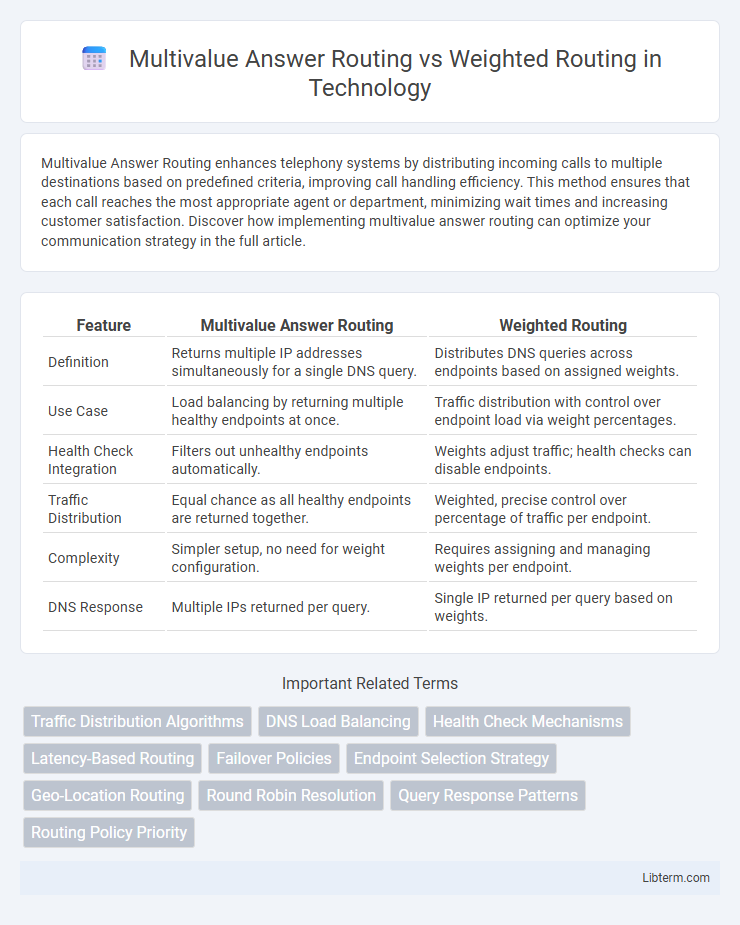Multivalue Answer Routing enhances telephony systems by distributing incoming calls to multiple destinations based on predefined criteria, improving call handling efficiency. This method ensures that each call reaches the most appropriate agent or department, minimizing wait times and increasing customer satisfaction. Discover how implementing multivalue answer routing can optimize your communication strategy in the full article.
Table of Comparison
| Feature | Multivalue Answer Routing | Weighted Routing |
|---|---|---|
| Definition | Returns multiple IP addresses simultaneously for a single DNS query. | Distributes DNS queries across endpoints based on assigned weights. |
| Use Case | Load balancing by returning multiple healthy endpoints at once. | Traffic distribution with control over endpoint load via weight percentages. |
| Health Check Integration | Filters out unhealthy endpoints automatically. | Weights adjust traffic; health checks can disable endpoints. |
| Traffic Distribution | Equal chance as all healthy endpoints are returned together. | Weighted, precise control over percentage of traffic per endpoint. |
| Complexity | Simpler setup, no need for weight configuration. | Requires assigning and managing weights per endpoint. |
| DNS Response | Multiple IPs returned per query. | Single IP returned per query based on weights. |
Introduction to Multivalue and Weighted Answer Routing
Multivalue Answer Routing enables DNS queries to receive multiple IP addresses in a single response, distributing traffic among various endpoints for improved load balancing and redundancy. Weighted Routing assigns different weights to DNS records, directing a proportionate amount of traffic to each endpoint based on predefined weights, optimizing resource utilization. Both methods enhance DNS traffic management by offering customizable routing strategies tailored to performance and availability requirements.
Defining Multivalue Answer Routing
Multivalue Answer Routing is a DNS routing technique that returns multiple IP addresses for a single domain name, allowing clients to choose from various servers based on availability or proximity. Weighted Routing assigns traffic proportionally across multiple endpoints based on predefined weights, optimizing load distribution according to server capacity. Multivalue Answer Routing enhances redundancy and client-side load balancing by providing several answer options simultaneously.
Understanding Weighted Routing Mechanism
Weighted routing allows traffic distribution based on assigned weights to each endpoint, enabling precise control over traffic flow percentages. Multivalue answer routing, by contrast, returns multiple DNS records simultaneously without specifying traffic distribution ratios. Understanding weighted routing is crucial for optimizing load balancing and ensuring efficient resource utilization across distributed systems.
Key Differences Between Multivalue and Weighted Routing
Multivalue Answer Routing returns multiple IP addresses simultaneously to balance traffic or provide redundancy, often used when clients handle the selection and failover. Weighted Routing assigns traffic distribution based on predefined weights to different endpoints, allowing precise control over traffic percentages for load balancing or regional distribution. The key difference lies in Multivalue's parallel response approach versus Weighted Routing's proportional traffic allocation strategy.
Performance Impact: Multivalue vs Weighted Routing
Multivalue Answer Routing directs DNS queries to multiple IP addresses simultaneously, promoting load distribution and potentially faster response times by offering redundancy. Weighted Routing assigns traffic to endpoints based on predefined weights, optimizing resource utilization but introducing slight latency due to processing weight algorithms. Performance impact analysis shows Multivalue Routing excels in simplicity and speed, while Weighted Routing benefits complex traffic management at minor latency costs.
Use Cases for Multivalue Answer Routing
Multivalue Answer Routing enhances DNS response efficiency by returning multiple IP addresses for a single query, ideal for simple load balancing and improving redundancy in geographically distributed applications. It suits use cases like global content delivery networks (CDNs) where user queries benefit from faster resolution through diverse IP responses. Weighted Routing distributes traffic based on predefined weights, better for granular control in scenarios requiring traffic allocation proportional to server capacity or operational cost.
Optimal Scenarios for Weighted Routing
Weighted Routing excels in scenarios requiring traffic distribution across multiple endpoints based on predefined weights, optimizing resource utilization and load balancing effectively. It is ideal for gradually shifting traffic during deployments, testing new versions, or scaling services dynamically while maintaining high availability. Multivalue Answer Routing suits environments favoring simple failover without traffic weighting, making Weighted Routing optimal for granular traffic control and strategic traffic management.
Pros and Cons of Multivalue Routing
Multivalue Answer Routing distributes traffic evenly across multiple resources by returning several IP addresses in response to a DNS query, enhancing redundancy and load balancing without requiring client-side support for weighted decisions. Pros of Multivalue Routing include simplicity in configuration and improved fault tolerance as clients can automatically switch to alternate addresses if one fails. Cons involve less precise traffic control compared to Weighted Routing, potential uneven load distribution due to client behavior, and limited compatibility with complex weighting strategies for traffic management.
Advantages and Limitations of Weighted Routing
Weighted routing in DNS enables precise traffic distribution based on assigned weights, optimizing resource utilization and improving service reliability by directing user requests to multiple endpoints proportionally. It allows seamless load balancing and gradual deployment of new services, reducing the risk of outages during updates. However, weighted routing's effectiveness depends on accurate weight configuration, and it may lack responsiveness to real-time performance changes or endpoint health compared to more dynamic routing strategies.
Choosing the Right Routing Strategy for Your Application
Choosing the right routing strategy for your application depends on factors such as traffic distribution, fault tolerance, and ease of management. Multivalue answer routing provides multiple IP addresses in DNS responses, enabling client-side load balancing and improved availability by distributing traffic evenly across healthy endpoints. Weighted routing assigns traffic based on predefined weights, allowing granular control over traffic distribution, ideal for gradual deployments, testing, or prioritizing certain resources over others.
Multivalue Answer Routing Infographic

 libterm.com
libterm.com